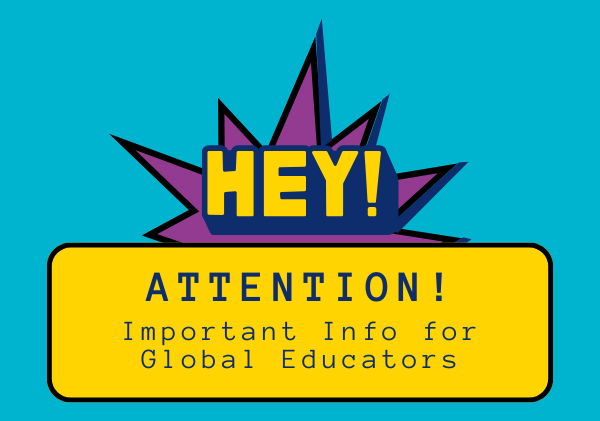ChatGPT Generated Briefing on the Pause for U.S. Study Abroad and Exchange Programs
Share Information and Resources in the Comments
This evening, I read about the State Department’s pause in funding various global education programs. I do not pretend to be an expert in this area, but I have been aware of some of these programs through my work with the Global Education Conference and now GLOW. I assume several organizations we’ve worked with over the years are being impacted. Please let me know if anything is erroneous, and I’ll edit this brief.
Overview The U.S. Department of State has suspended funding for key international education and exchange programs, initially announced as a 15-day pause but now extended indefinitely. This decision impacts thousands of American students seeking international study opportunities and international scholars coming to the United States. Affected programs include the Fulbright Program, the Gilman Scholarship, the International Research and Exchanges Board (IREX), and the Critical Language Scholarship Program.
Impact on U.S. Students
Higher Education: College students face disruptions in study abroad programs, affecting academic progress, career opportunities, and global competencies.
K-12 Education: Programs such as the Kennedy-Lugar Youth Exchange and Study (YES) Program and the Congress-Bundestag Youth Exchange (CBYX) have been suspended, depriving high school students of international experiences.
Financial Burdens: Many students rely on scholarships and government funding for international education. Without funding, students must delay or cancel their plans.
Impact on International Students & Institutions
Inbound Exchanges: The funding freeze affects international students coming to U.S. institutions, impacting campus diversity and cross-cultural collaboration.
Global Competitiveness: The loss of international students may reduce the U.S.'s appeal as a top education destination.
Economic Impact: The reduction in international students affects universities financially, as many depend on international enrollment fees.
Source: Monitor ICEF
Intersection with USAID Funding Cuts In addition to the State Department’s funding freeze, USAID has also experienced major cuts, impacting global educational initiatives and humanitarian efforts. This intersection creates additional barriers for students and educational institutions, including:
Education Access Loss: Many USAID-funded programs provide educational resources and scholarships for students in developing nations. Without funding, students from low-income backgrounds lose access to educational opportunities, further limiting international academic collaboration.
Humanitarian Impact: USAID supports educational initiatives focused on crisis-affected regions. Cuts to these programs disrupt learning environments for displaced and refugee students, diminishing the U.S.'s role in supporting global education.
Reduction in Institutional Partnerships: Many universities in the U.S. partner with USAID to fund research and development programs in education. These partnerships now face uncertainty, limiting opportunities for students and faculty to engage in international education projects.
Source: Time
Actions to Take
Contact Congress: Urge representatives to restore funding for international education programs.
Use advocacy platforms such as VoterVoice
Sign Petitions: Participate in online petitions supporting funding reinstatement.
Example: Change.org
Stay Informed: Follow organizations providing updates and advocacy alerts.
Engage with Institutions: Collaborate with universities and non-profits to advocate for funding restoration.
Conclusion: The indefinite suspension of study abroad, international exchange funding, and cuts to USAID programs threaten academic, economic, and diplomatic relations. Advocating for policy change and staying informed is critical to ensuring the future of global education opportunities.
Addendum
I also searched for organizations that seem to have received State Department funding in recent years. I’m sure there are more and will add them as I continue this research.
Several K-12-focused non-profit organizations have received funding from the U.S. Department of State to administer international exchange, study abroad, and global education programs. Notable organizations include:
AFS Intercultural Programs: AFS-USA administers various programs funded by the U.S. Department of State, such as:en.wikipedia.org
Congress-Bundestag Youth Exchange (CBYX): A reciprocal exchange program between the U.S. and Germany, offering scholarships for American and German students.
National Security Language Initiative for Youth (NSLI-Y): Provides scholarships to American high school students for immersive language study in critical-need languages abroad.en.wikipedia.org
Kennedy-Lugar Youth Exchange and Study (YES) Program: Offers scholarships for students from countries with significant Muslim populations to study in the U.S., and for American students to study abroad in these countries.en.wikipedia.org+1en.wikipedia.org+1
Ayusa International: Ayusa administers several U.S. Department of State-funded programs, including:en.wikipedia.org
Kennedy-Lugar Youth Exchange and Study (YES) Program: Facilitates cultural exchange between the U.S. and countries with significant Muslim populations.
Congress-Bundestag Youth Exchange (CBYX): Supports reciprocal exchanges between American and German students.
Greenheart Exchange: Greenheart Exchange is a non-profit organization facilitating cultural exchange experiences for over 175,000 participants. While specific State Department-funded programs are not detailed in the available information, Greenheart Exchange's initiatives align with the objectives of fostering global understanding through student exchanges. greenheartexchange.org
Fulbright Teacher Exchanges: Administered by IREX, the U.S. Department of State funds these programs and provide opportunities for educators to engage in professional development and cross-cultural exchanges, thereby enhancing global education at the K-12 level. fulbrightteacherexchanges.org
World Link: World Link is a non-profit international student exchange organization that focuses on youth leadership development. Funded by the U.S. Department of State, World Link serves as a placement organization for the Kennedy-Lugar Youth Exchange and Study (YES) Program and the Future Leaders Exchange (FLEX) Program, administering participant activities. en.wikipedia.org
American Councils for International Education: American Councils administers the Future Leaders Exchange (FLEX) Program, which provides scholarships for high school students from Eurasia to spend a year in the United States, living with host families and attending American high schools. The program aims to develop leadership abilities and cultural awareness among participants. en.wikipedia.org+3en.wikipedia.org+3en.wikipedia.org+3





